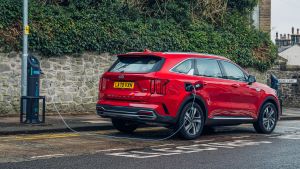Verdict
The Kia Sorento remains one of our favourite large SUVs. Private buyers should consider how quickly they’ll recoup the additional cost of this more expensive plug-in model before taking the plunge, though the inevitable tax breaks for company car drivers mean it’ll be a popular fleet choice. The standard hybrid is better to drive and more efficient if you don’t have the means to regularly plug in, but keeping the battery topped up makes this an incredibly quiet and surprisingly luxurious family SUV.
Now in its fourth generation, the Sorento SUV has followed Kia through its transformation from budget brand to upmarket disrupter.
Launching back in 2002, the original was a practical but largely uninspiring SUV that did little to upset its mainstream rivals. But the new version, which made its debut last year with hybrid and diesel power, saw Kia back to its best. The new Sorento’s blend of premium features and impressive practicality bowled us over, beating the venerable Skoda Kodiaq in a head-to-head test.
- SEE MORE Best mid-size SUVs on sale 2021
And now there’s a plug-in hybrid version. It pairs a 13.8kWh battery with the standard car’s 1.6-litre turbo petrol engine, and total power stands at 261bhp. Kia reckons the Sorento PHEV can do up to 35 miles on electric power alone.
The result is a fleet-pleasing 38g/km of CO2 emissions – and a Benefit in Kind (BiK) tax rating of 11 per cent (from 6 April). That matches the less practical Ford Kuga PHEV and beats more expensive rivals like the Volvo XC90 Recharge T8; the Skoda isn’t currently available as a plug-in hybrid.
Opting for this plug-in Sorento will be a matter of course for company car drivers, then, but private buyers should do their sums before taking the plunge. Kia is currently offering the PHEV with a £2,500 ‘Kia plug-in hybrid’ discount, but the result is still a premium of a little over £4,000 versus a similarly-specified Sorento hybrid. Every PHEV breaches the £40k threshold for higher road tax too, so you’ll need to do an awful lot of electric miles to make up the shortfall.
Specifications largely mirror those of other Sorento models, with the single exception being that every PHEV comes with 19-inch wheels; basic hybrid variants get 17-inch rims for a plusher ride. And yet even entry-level 2 versions like ours get an eight-inch touchscreen, heated seats and a heated steering wheel, a fully digital instrument cluster and LED lights. Kia reckons fleet buyers will favour this model, while private customers are likely to opt for the flagship 4 version. A mid-spec 3 trim is also available.
Going for the range-topper brings luxuries like a glass panoramic roof, ventilated electric Nappa leather seats, keyless go and a head-up display. You’ll pay for the privilege, though; the Sorento PHEV in 4 trim costs almost £150 per month more (£637) than the 2 on a three-year PCP deal with an identical £6k deposit.
We rated the Sorento’s driving experience very highly when we tried it last year, and much of what we loved about the hybrid has transferred to this plug-in model. Body control is impressive, for example, especially for something so tall and heavy. Performance is as strong as you’d want in a car like this, too; 0-60mph takes 8.4 seconds, with instant power from the electric motor giving it great punch off the line.
The steering doesn’t offer much feel, but it’s consistently weighted and while the ride is on the firm side, the accomplished damping takes the edge off deep potholes and loose drain covers. It’s all but silent running in EV mode, as you’d expect, but even at higher speeds the engine does little to disturb comfort or refinement.
In fact, the most noticeable noise is at a standstill, when the petrol motor has a tendency to cut in and out involuntarily, presumably to keep the 12-volt battery topped up. When the car runs so happily on electricity (we saw roughly 27 miles on our mixed test route) most of the time, it’s a shame the peace and quiet can be interrupted when stationary.
In truth, the standard hybrid feels as if its powertrain is better integrated. The plug-in can be slow to respond when you put your foot down – especially when rolling out of a junction or away from a roundabout, hesitating as the car’s computers decide which power source it prefers. Like many plug-in hybrids, the Sorento is at its best running around with a full battery.
Keeping this SUV charged will work wonders for your average fuel economy, of course. We saw around 35mpg with the battery depleted, around 5-6mpg less than the lighter hybrid model. Thankfully, charging is easy; it’ll take 3hrs 25mins to realise that EV range using a 3kW home wallbox, or five hours via a standard domestic socket. Cables for both charging types are included as standard.
Kia claims the car’s new platform frees up more space in every row, resulting not only in seven usable seats, but a huge van-like boot, too. More impressive is the fact this PHEV model sacrifices just four litres (leaving 604 litres in total) of space to the standard hybrid with the rearmost row folded flat. The maximum load volume for the plug-in stands at a cavernous 1,988 litres.
Elsewhere, the Sorento PHEV feels as luxurious and solidly built as its non-plug-in sibling. Granted, our 2-spec test car did without the lush Nappa leather and gloss trim of more expensive models, but as a family car it ticks all the right boxes.
The dashboard perhaps lacks a little flair, but it’s logically laid out and the central screen is easy to navigate. Thankfully, Kia has kept the climate controls separate from the main display, too, making them simple to operate on the move.
| Model: | Kia Sorento 2 PHEV 1.6 T-GDi 6-speed AT AWD |
| Price: | £44,995 |
| Engine: | 1.6-litre 4cyl petrol plus electric motor |
| Power/torque: | 261bhp/350Nm |
| Transmission | Six-speed auto, four-wheel drive |
| 0-60mph: | 8.4 seconds |
| Top speed: | 119mph |
| Fuel economy/CO2: | 176.6mpg/38g/km |
| On sale: | Now |
from Sitewide RSS feed https://bit.ly/2Pn4LHh

















Comments
Post a Comment